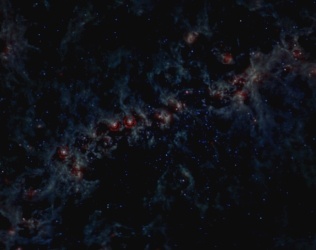 
 The heat death of the universe is a hypothesis on the ultimate fate of the universe, which suggests the universe will evolve to a state of no thermodynamic free energy, and will therefore be unable to sustain processes that decrease entropy. It might better be described as 'the death of heat'. In other words, temperature differences or other processes may no longer be exploited to perform work; the universe reaches thermodynamic equilibrium.
The heat death of the universe is a hypothesis on the ultimate fate of the universe, which suggests the universe will evolve to a state of no thermodynamic free energy, and will therefore be unable to sustain processes that decrease entropy. It might better be described as 'the death of heat'. In other words, temperature differences or other processes may no longer be exploited to perform work; the universe reaches thermodynamic equilibrium.The universe will continue expanding forever, and a heat death is expected to occur, with the universe cooling to approach equilibrium, at a very low temperature after a very long time period ... at least one googol, or 10100 years in the future. The idea of heat death stems from the second law of thermodynamics, which states that entropy tends to increase in an isolated system. Entropy is the measure of a system's thermal energy that is unavailable for doing useful work. Because work is obtained from ordered molecular motion, the amount of entropy is also a measure of the molecular disorder, or randomness, of a system. The result is that if the universe lasts for a sufficient time, it will asymptotically approach a state where all energy is evenly distributed. In other words, there is a tendency in nature to the dissipation of mechanical energy into thermal energy, so that, in time, the mechanical movement of the universe will run down as work is converted to heat. The conjecture is that all bodies in the universe cool off, eventually becoming too cold to support life; the final state, in this view, is described as one of 'equilibrium' in which all motion ceases. From the Big Bang through the present day, matter and dark matter in the universe are thought to have been concentrated in stars, galaxies, and galactic clusters, and are presumed to continue to do so well into the future. Therefore, the universe is not in thermodynamic equilibrium, and objects can do physical work. How long is this likely to last? The decay time for a supermassive black hole of roughly 1 galaxy mass (1011 solar masses), because of Hawking radiation, is in the order of 10100 years, so entropy can be produced until at least that time. Larger black holes due the collapse of superclusters of galaxies are predicted to continue to grow, but even these would evaporate over a timescale of up to 10106 years. After that time, the universe enters the so-called Dark Era and is expected to consist chiefly of a dilute gas of photons, electrons and neutrinos. With only very diffuse matter remaining, activity in the universe will have tailed off dramatically, with extremely low energy levels and extremely long timescales. |